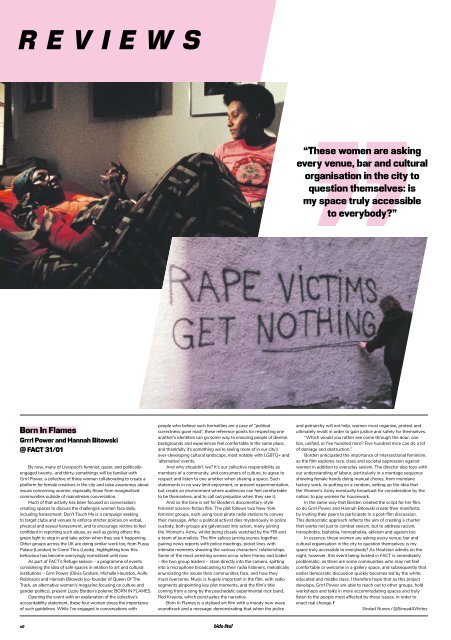Issue 86 / March 2018
March 2018 issue of Bido Lito! magazine. Featuring: ELEANOR NELLY, BREAK WAVE, FIELD MUSIC, EVERYMAN THEATRE, JORJA SMITH, GARY NUMAN and much more.
March 2018 issue of Bido Lito! magazine. Featuring: ELEANOR NELLY, BREAK WAVE, FIELD MUSIC, EVERYMAN THEATRE, JORJA SMITH, GARY NUMAN and much more.
Create successful ePaper yourself
Turn your PDF publications into a flip-book with our unique Google optimized e-Paper software.
REVIEWS<br />
“These women are asking<br />
every venue, bar and cultural<br />
organisation in the city to<br />
question themselves: is<br />
my space truly accessible<br />
to everybody?”<br />
Born In Flames<br />
Grrrl Power and Hannah Bitowski<br />
@ FACT 31/01<br />
By now, many of Liverpool’s feminist, queer, and politicallyengaged<br />
twenty- and thirty-somethings will be familiar with<br />
Grrrl Power, a collective of three women collaborating to create a<br />
platform for female creatives in the city and raise awareness about<br />
issues concerning women, especially those from marginalised<br />
communities outside of mainstream conversation.<br />
Much of that activity has been focused on conversation;<br />
creating spaces to discuss the challenges women face daily,<br />
including harassment. Don’t Touch Me is a campaign seeking<br />
to target clubs and venues to enforce stricter policies on verbal,<br />
physical and sexual harassment, and to encourage victims to feel<br />
confident in reporting such abuse, as well as giving others the<br />
green light to step in and take action when they see it happening.<br />
Other groups across the UK are doing similar work too, from Pussy<br />
Palace (London) to Come Thru (Leeds), highlighting how this<br />
behaviour has become worryingly normalised until now.<br />
As part of FACT’s Refuge season – a programme of events<br />
considering the idea of safe spaces in relation to art and cultural<br />
institutions – Grrrl Power (Olivia Graham, Michelle Houlston, Aoife<br />
Robinson) and Hannah Bitowski (co-founder of Queen Of The<br />
Track, an alternative women’s magazine focusing on culture and<br />
gender politics), present Lizzie Borden’s polemic BORN IN FLAMES.<br />
Opening the event with an explanation of the collective’s<br />
accountability statement, these four women stress the importance<br />
of such guidelines. While I’ve engaged in conversations with<br />
people who believe such formalities are a case of “political<br />
correctness gone mad”, these reference points for respecting one<br />
another’s identities can go some way to ensuring people of diverse<br />
backgrounds and experiences feel comfortable in the same place,<br />
and thankfully it’s something we’re seeing more of in our city’s<br />
ever-developing cultural landscape, most notably with LGBTQ+ and<br />
‘alternative’ events.<br />
And why shouldn’t we? It’s our collective responsibility as<br />
members of a community, and consumers of culture, to agree to<br />
respect and listen to one another when sharing a space. Such<br />
statements in no way limit enjoyment, or prevent experimentation,<br />
but create an environment where audiences can feel comfortable<br />
to be themselves, and to call out prejudice when they see it.<br />
And so the tone is set for Borden’s documentary-style<br />
feminist science-fiction film. The plot follows two New York<br />
feminist groups, each using local pirate radio stations to convey<br />
their message. After a political activist dies mysteriously in police<br />
custody, both groups are galvanised into action, many joining<br />
the Women’s Army, whilst being closely watched by the FBI and<br />
a team of journalists. The film splices jarring scenes together,<br />
pairing news reports with police meetings, picket lines with<br />
intimate moments showing the various characters’ relationships.<br />
Some of the most arresting scenes occur when Honey and Isabel<br />
– the two group leaders – stare directly into the camera, spitting<br />
into a microphone broadcasting to their radio listeners, melodically<br />
enunciating the issues their communities face, and how they<br />
must overcome. Music is hugely important in the film, with radio<br />
segments pinpointing key plot moments, and the film’s title<br />
coming from a song by the psychedelic experimental rock band,<br />
Red Krayola, which punctuates the narrative.<br />
Born In Flames is a stylised art film with a moody new wave<br />
soundtrack and a message; demonstrating that when the police<br />
and patriarchy will not help, women must organise, protest and<br />
ultimately revolt in order to gain justice and safety for themselves.<br />
“Which would you rather see come through the door: one<br />
lion, unified, or five hundred mice? Five hundred mice can do a lot<br />
of damage and destruction.”<br />
Borden anticipated the importance of intersectional feminism,<br />
as the film explores race, class and societal oppression against<br />
women in addition to everyday sexism. The director also toys with<br />
our understanding of labour, particularly in a montage sequence<br />
showing female hands doing manual chores, from mundane<br />
factory work, to putting on a condom, setting up the idea that<br />
the Women’s Army eventually broadcast for consideration by the<br />
nation: to pay women for housework.<br />
In the same way that Borden created the script for her film,<br />
so do Grrrl Power and Hannah Bitowski create their manifesto;<br />
by inviting their peers to participate in a post-film discussion.<br />
This democratic approach reflects the aim of creating a charter<br />
that works not just to combat sexism, but to address racism,<br />
transphobia, biphobia, homophobia, ableism and ageism too.<br />
In essence, these women are asking every venue, bar and<br />
cultural organisation in the city to question themselves: is my<br />
space truly accessible to everybody? As Houlston admits on the<br />
night, however, this event being hosted in FACT is immediately<br />
problematic, as there are some communities who may not feel<br />
comfortable or welcome in a gallery space, and subsequently that<br />
earlier democratic discussion quickly becomes led by the white,<br />
educated and middle class. I therefore hope that as this project<br />
develops, Grrrl Power are able to reach out to other groups, hold<br />
workshops and talks in more accommodating spaces and truly<br />
listen to the people most affected by these issues, in order to<br />
enact real change. !<br />
Sinéad Nunes / @SineadAWrites<br />
40


















